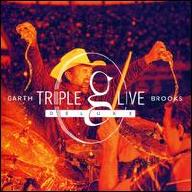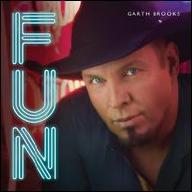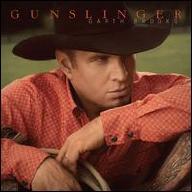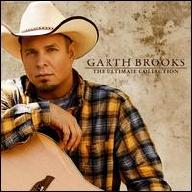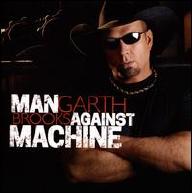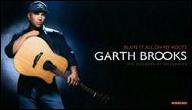Garth Brooks is the son of Troyal and Colleen Carroll Brooks. Colleen was a country singer herself, recording a handful of records for Capitol in the mid-'50s that never experienced any chart success. As a child, Garth was interested in music and frequently sang at family gatherings, but he concentrated on athletics. He received a partial athletic scholarship at Oklahoma State University as a javelin tosser, but he wound up dropping the sport during his collegiate career. While he was at college, Brooks began singing in local Oklahoma clubs, often with lead guitarist Ty England.
After he graduated with an advertising degree in December of 1984, Garth Brooks decided to try to forge out a career as a country singer. In 1985 he traveled to Nashville with hopes of being discovered by a record label. Just 23 hours after arriving in Nashville, he returned to Oklahoma, frustrated with the industry, his prospects, and his naïve dreams. Brooks continued to perform in Oklahoma clubs, and in 1986, he married his college girlfriend, Sandy Mahl.
The couple moved to Nashville in 1987, this time with a better idea of how the music industry operated. Brooks began making connections with various songwriters and producers, and he sang on a lot of songwriter's demo tapes. Although he had made several connections within the industry and had a powerful management team, every label in town was refusing to sign him. In 1988, six weeks after Capitol Records passed on his demo, one of the label's executives saw Brooks sing at a local club. Impressed with the performance, the executive convinced the label to sign Garth.
Brooks recorded his first album with producer Allen Reynolds at the end of 1988; the self-titled debut appeared early in 1989. The album was an instant success, with its first single, "Much Too Young (To Feel This Damn Old)," climbing into the country Top Ten. Garth's debut was a success, crossing over into the pop album charts, but it was overshadowed by the blockbuster appeal of Clint Black, as well other similar new male vocalists like Travis Tritt and Alan Jackson. Within a year, Brooks would tower above them all with his surprise, widespread success.
He had three other hit singles -- the number one "If Tomorrow Never Comes," the number two "Not Counting You," and the number one "The Dance" -- but it was his second album, No Fences, that established him as a superstar. No Fences was released in the fall of 1990, preceded by the massive hit single "Friends in Low Places." No Fences spent 23 weeks at the top of the country charts and sold 700,000 copies within the first ten days of its release. Throughout 1990 and 1991, Brooks had a string of number one country hits from the album, including "Unanswered Prayers," "Two of a Kind, Workin' on a Full House," and "The Thunder Rolls." By 1993, No Fences would sell over ten million copies.
Not only did his record sales break all the accepted country conventions, but so did Garth Brooks' concerts. By the end of 1990, he was selling out stadiums within minutes and was putting on stadium-sized shows, patterned after '70s rock extravaganzas. Brooks used a cordless headset microphone so he could run around his large stage. He had an elaborate light show, explosions, and even a harness so he could swing out above the crowd and sing to them. It was the first time any country artist had incorporated such rock & roll techniques into stage shows.
Ropin' the Wind, Brooks' third album, was released in September of 1991 and became the first country record to debut at the top of the pop charts. Ropin' the Wind matched the success of No Fences, selling over ten million copies within its first two years of release and spawning the number one hit singles "Shameless," "What She's Doing Now," and "The River."
By the end of 1991, Brooks had become a genuine popular music phenomenon -- even his 1992 Christmas album, Beyond the Season, went multi-platinum -- and there were no signs of his momentum slowing down. Naturally, a backlash began to develop in the fall of 1992, beginning with the release of "We Shall Be Free," the first single from his fourth album. Featuring a strong gospel underpinning, the single stalled at number 12 and many radio stations refused to play it. It was indicative of the eclectic nature of his forthcoming album, The Chase, which pushed the boundaries of contemporary country. The Chase debuted at number one upon its October 1992 release and by the end of the year, it sold over five million copies. Nevertheless, that number was half the size of the figures for his two previous albums and there was speculation in the media that Brooks' career had already peaked.
Sensing that he was in danger of losing his core audience, Brooks returned to straight country with 1993's In Pieces. The album was critically acclaimed and sold several million copies, though it was clear that Brooks would not reach the stratospheric commercial heights of No Fences and Ropin' the Wind again. Even so, he remained one of the most successful artists in popular music, one of the few guaranteed to sell millions of records with each new album, as well as sell out concerts around the world.
The Hits, which was only available for a year, was released in the fall of 1994 and would eventually sell over eight million albums. Brooks released Fresh Horses, his first album of new material in two years, in November 1995; within six months of its release, it had sold over three million copies. Despite its promising start, Fresh Horses plateaued quickly, topping out at quadruple platinum -- a healthy number for any artist, but a little disappointing considering Brooks' superstar status. He decided to push his seventh album, appropriately titled Sevens, very hard to confirm his superstar status. Originally, it was scheduled to be released in August 1997, when he would promote it with a huge concert in Central Park. Plans went awry when Capitol experienced a huge management shake-up, leaving many of his contacts at the label out in the cold. Upset at the new management, Brooks held back the release of Sevens until he received commitment for a major marketing push for the album. He went ahead and performed the Central Park concert, which received major coverage in the media. On the strength of the concert, Capitol acquiesced to Brooks' demands, and Sevens was released in November 1997. Sevens catapulted to number one upon its release and quickly went multi-platinum over the holiday season.
The following spring, Brooks pulled his first six albums out of print and issued The Limited Series, a box set that contained all six records plus bonus tracks. Once all two million copies of The Limited Series were sold, the individual albums would remain out of print until their tenth anniversary, when they would be released only on DVD audio. The Double Live set followed in late 1998, and its sales were brisk but not quite as heavy as projected. In the spring of 1998, Brooks unsuccessfully tried out for the San Diego Padres pro baseball team, a major indication of his growing desire to expand his success beyond country music.
Once it became clear that professional baseball wasn't in his future, he became fascinated with film, specifically starring in The Lamb, a supposed thriller about a conflicted, tortured rock star called Chris Gaines. He was determined to win the role, and he did after extensive lobbying. Sometime in the spring of 1999, the film was given the green light with Babyface as a producer and Brooks as the star. During pre-production, Brooks decided the best way to prep for the role was to become Chris Gaines. He invented a brooding, leather-clad image and filled in holes in Gaines' backstory by inventing biographies and a musical history. The most important piece in the puzzle was a collection of Gaines' "greatest hits," since it would prime audiences for the big-budget spectacular of The Lamb, scheduled for late 2000. So, Brooks jumped the gun, recording a set of 13 songs -- as Chris Gaines -- that would fill in the fictional singer's history.
As the Chris Gaines album was about to hit stores, Brooks' new persona was revealed to the public. Since the machinations of The Lamb were only known to music insiders and fans who religiously followed the trades, Brooks' sudden re-emergence as a slimmed-down, soul-patched, shaggy-haired soulful pop crooner was utterly bizarre to almost every observer. There was a massive PR campaign to shed light on Chris Gaines, complete with a TV special, but the details were so convoluted that it couldn't be explained easily. In the Life of Chris Gaines was released at the end of September 1999, and although it entered the charts at number two, it was a major commercial disappointment; by the time Christmas rolled around, some major stores were offering heavy discounts on the record in hopes of clearing out unsold stock. Fan bewilderment over the Gaines project also likely hurt sales of Brooks' second holiday record, Garth Brooks the Magic of Christmas, a traditional pop-styled outing that appeared just two months later.
Brooks kept a low profile through most of 2000, as the disastrous marketplace showing of the Chris Gaines album scuttled plans for The Lamb, which was shelved. His personal life was also in turmoil, as he and his wife announced that they were divorcing in October of 2000. By the time the divorce was finalized the following year, Brooks was on his way to retirement, choosing to retreat from music and concentrate on fatherhood. He announced that his next album, Scarecrow, would be his last and it was released to appropriate fanfare that November, debuting at number one on the Billboard pop and country charts, but failing to generate a hit single bigger than "Wrapped Up in You," which peaked at number five.
After the release of Scarecrow, Brooks eased into retirement, spending the next few years quietly and not resurfacing in the public eye until 2006. Toward the end of that year, he married country singer Trisha Yearwood on December 10, but prior to that, he struck a deal with Walmart to become the exclusive retailer for his back catalog. The first release under this deal was a new box set called The Limited Series that collected all the albums he released after his first box set called The Limited Series. This second Limited Series was released in time for the holiday season of 2005 and also included a new disc of outtakes called The Lost Sessions, which was later released as an individual disc in 2006. The Lost Sessions featured a duet with Yearwood called "Love Will Always Win," which climbed to 23 on the country charts in 2006, a modest placing that was nevertheless his biggest hit since "Wrapped Up in You."
During the next eight years, Brooks continued to perform sporadically, including a run of weekends on the Las Vegas Strip, but he did not record any new material, announcing that he would only return once his youngest daughter had gone to college. In 2013, he began to ease into his comeback, first releasing a box set of covers called Blame It All on My Roots for that year's holiday season. As he was promoting the set, Brooks revealed that he would be going on a world tour the following year. Prior to the tour's summer launch, Brooks announced that he had signed to Sony Music Nashville and would be releasing his ninth studio album in November, with another to follow in 2015. Man Against Machine was preceded by the single "People Loving People," which peaked at 25 on Billboard's country charts, and also coincided with the first-ever digital release of Brooks' back catalog. Man Against Machine debuted at number one on Billboard's country albums chart -- it went in at four on the Top 200 -- and had no Top Ten singles.
In 2016, Brooks released three albums for the holidays: the seasonal album Christmas Together with Trisha Yearwood; the box set The Ultimate Collection; and a new album, Gunslinger. A year later, Brooks released The Anthology: Pt. 1, The First Five Years, the first installment in a multi-volume memoir that was accompanied by music, including a few rarities from his early years. The Anthology: Pt. 1 hit number one Top Country Albums chart and peaked at four on the Billboard 200. The studio singles "All Day Long" and "Stronger Than Me" were released in 2018. A new live album, Triple Live (which featured three discs of music culled from his 2014-2017 world tour), was also scheduled for release that year, but was postponed.
In the spring of 2019, Brooks began his massive Stadium Tour, during which he planned to play shows at 30 North American stadiums over three years. He also teamed up with Blake Shelton for the duet "Dive Bar," which was promoted with a much smaller-scale tour of seven U.S. dive bars starting in Chicago that July. For the 2019 holiday season, Brooks released Legacy Collection, a box set featuring No Fences, The Chase, In Pieces, Fresh Horses, and Triple Live, available as vinyl/CD combinations in a variety of fashions. He returned with Fun, his 14th studio album, in 2020. Featuring the singles "All Day Long" and the Shelton-assisted "Dive Bar," the LP climbed to number seven on the Billboard Top Country Albums chart.
Brooks racked up honorariums in 2020 and 2021, receiving the Library of Congress Gershwin Prize for Popular Song in '20 and being named a recipient for the Kennedy Center Honors in '21; he also performed "Amazing Grace" at the inauguration of President Joe Biden. ~ Stephen Thomas Erlewine, Rovi



